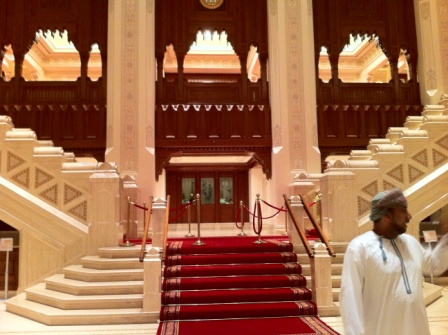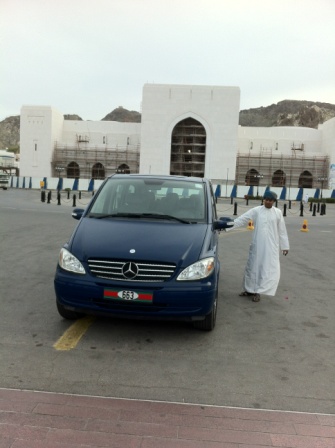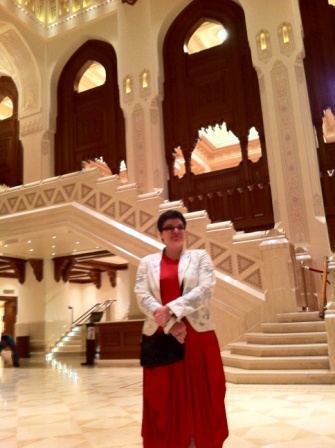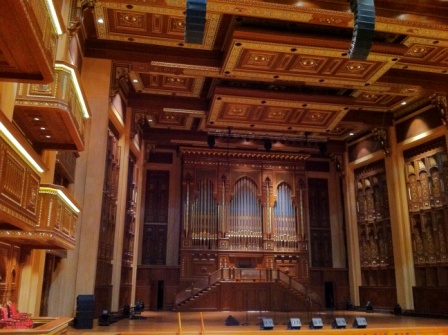Since childhood we hear that we should not be greedy, we shouldn’t take (have) more that ‘enough’. In adulthood, we are told how important ‘knowing our enough’ really is: in food, play, love and money. Heck, even I have written articles in this blog about working out how much is enough and John even used the assumptions we set out to design a retirement calculator.
During my visit to the Gulf last week, however, I started asking myself the question whether it is possible to have too much money.
Now, my experience of wealth is limited: during my time on Earth I have met many people who are ‘comfortable’; in fact probably most of the people I know fall in this category. These are my neighbours, my colleagues and the folks I meet in the shopping dives of The Village (we only called it that, it is no village but part of a major metropolis with coffee bars, many restaurants etc.). I know some wealthy people: a friend who’s family supplies whisky and gin to all major supermarkets comes to mind but then again she is probably one of the most careful with money people I have met – and not only because she is Scottish.
Before last weekend, I have never come anywhere even close to anyone who is insanely rich!
How did I get close – only geographically, I hasten to add – to an insanely wealthy person? By spending four days in Oman at the invitation of the Omani research council. Now, this is something that I do often; I go places and discuss matters of science, innovation and (from time to time) entrepreneurial universities creep into the conversation. This time transforming universities to be more entrepreneurial was the conversation. Still, not important enough to get me near the inner circle of Sultan Qaboos bin Sa’id.
Please don’t get too excited; I didn’t meet the Sultan (although, one of his relations did attend the first part of the workshop at which I spoke). But for three days, I was driven in a car from the personal fleet of His Majesty, by one of the drivers of His Majesty: Jaba, a young man with a quick smile, quiet dignity and exceptional punctuality.
Oman is one of the Gulf states and as the rest of them is mostly desert. Even the Green Mountain is apparently far from green with vegetation. And just like other Gulf states, Oman has more oil than water. Sultan Qaboos is its absolute monarch – I can see it on the streets where his portrait is everywhere. Hence, he has an estimated wealth of about $700 million – mainly from oil.
Doing my reading, however, I started discovering an interesting side to Sultan Qaboos; and one that illustrates ones again that ‘enlightened dictatorship’ has a positive role to play in the development of nations. To begin with, he opened the country and started economic reforms after coming to power in 1970. In 1997, the Sultan of Oman decreed that women could stand for election to the majlis (the Consultative Council). In 2011, in part as a reaction to the Arab Spring, he stated that Oman’s future is not with oil but with developing as a knowledge society – this links to why I was in Oman. I also met the first Omani female minister with portfolio – the Minister for Higher Education, one of the strongest women I have ever met.
But let us get back to the question whether or not it is possible to have too much money. It is already clear that a pauper the Sultan of Oman is not: there are ornaments of pure gold on the outside of his palace and his ‘yacht’ is a big monster of a ship. So far, I would have said ‘yeah, the guy has more money than sense’.
And I would have stood by this were it not for the fact that the same guy has built a children’s public library (the first public library in Oman) and is in the process of building one for adults; he was also behind building the opera house of Oman. These are all ways to integrate society and to bring awareness of a different culture.
I visited the Opera House thanks to the hospitality of Her Excellency the Minister of Education; and for an hour felt like a character straight out of the stories of Scheherazade.
The Opera House took about seven years to build; not because there were delays but because the marbles were imported from Italy and France, the woods from Turkey and India, and all was hand carved. The organ was build in Germany and its tubes are from pure gold (not sure whether it makes difference to the sound but it sure speaks of wealth); the acoustics is the dream of any opera singer.
And you know what? It is not only that Sultan Qaboos paid for building the Opera House from his personal wealth but the costs are a state secret. He also, supported the Omani employees of the Opera House to spend time abroad to learn how to manage it. A proportion of the tickets for the shows are subsidised – in Oman it is possible to go to the opera for the equivalent of £8 ($12).
It is possible to have too much money only when one spends it all on one’s own whims. When one is prepared to spend one’s fortune for the benefit of others money can’t be too much: it becomes a powerful vehicle for doing good.
What do you think, can one have too much money?




money can certainly spoil you when you use it to buy stuff instead of spending it on whatever makes you truly happy. That can be charity, building a trust for your children, pursuing a passion, whatever floats your boat, really. It would be a good problem to have but not for materialistic people.
@Pauline: Quite; and you are absolutely right – the problem is not money, the problem is materialism.
I work with a large number of students from the Gulf Region. Interestingly enough, my favorite students come from Oman! The students that have been the most challenging have been from Kuwait. The students admit that everywhere in Kuwait is like living in Beverly Hills. The students (many are very sweet) have a very difficult time fending for themselves and thinking strategically because their families typically pay for people to “handle” the things that a lot of us tend to do for ourselves. After awhile they do become self-sufficient but for some it is truly a struggle to integrate into American society where people as a rule take pride in “doing for themselves.” Things like cooking-they will order out everyday or cleaning-some of their places have been shocking after they moved out, or washing their clothes. They just go and buy new ones because they aren’t sure how to do their wash. I’m all for having money but it keeps people from being able to function on their own (from time to time) then it’s too much!
@Michelle: I did notice a difference – the Omani are punctual, more opne minded and have slightly different aspiration sfrom the other places in the area (may be because, relatively speaking they don’t have that much oil). Funny you should mention that people from the region don’t know how to look after themselves because someone at the workshop (a prof at the uni) said that they can’t expect their young people to be independent thinkers if they continue having averything done for them. Amazing how many people in the room agreed that having servants has gone too far.
Part of what you saw is cultural. Remember, having money does not mean you know what to do with it. My experience with very rich people who are showy with their wealth are generally people who are newly rich.
@Krant: Quite right! We have a friend who was a diplomat in the area and he said that the Arab princes have several layers of curtains – they go to Europe, lile the curtains and put another layer. But it is all changing fast – the Gulf coutries are realising that the oil will end whether because there is no more or because we no loger need it (like the srone age :)).
A very thoughtful post showing the other side of the |(rather large) coin.
We do tend to castigate people who inherit money but it is so true that what they do with their wealth is more important than the fact that they have it.
I think that goes for all of us, no matter how much or little we have.
BTW: Like the dress 🙂
@Pat: Wisdom flows from your keyboard :). The dress is one of my favourites as well; and now I have a bright red pashmina as well (bought at the best suk in Muscat and a lot of bargaining went into the purchase; not by me but by my PhD student).
I quite liked Oman in my one short visit. Its history goes back more than people would think, when its maritime empire ruled all the way down to Tanzania. Sultan Qaboos is an interesting personality. Not many rulers in the Middle East can claim to be the 14th of his dynasty.
@101Centavos: I liked it and I suppose that I would have been even more taken if I had longer there – in mid-1990s we went to Abu Dabi and the desert took my heart. Yes, the Omanis were collonisers; they were also part of the Arab scientific and technological glory when the centre of these things was with the Arab world. Omanis built great ships, compases, were great in geometry and navigation. Then there were wars and they found oil.
I think a person can have too much money if there is no appreciation for it or understanding of how hard it is to obtain. This may not be the case with first generation wealthy, but would be increasing likely with subsequent generations one would think.
That is a lot of money. But I agree with Pauline. It’s not about how much money you have but how happy you are. If you think you have too much, it should be shared to other such as s charity. The happiness it brings are priceless.